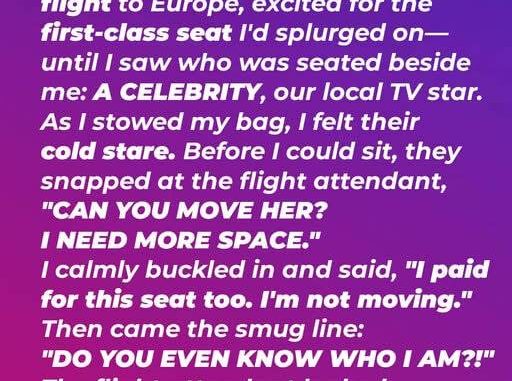
I was thrilled about my first-class seat on a long-haul flight to Europe—until I saw who’d be sitting next to me: Miranda Davis, our local TV celebrity.
As I stowed my suitcase overhead, she shot me a glare like I’d just insulted her family.
“CAN YOU MOVE HER?” she barked at the flight attendant. “I NEED ROOM.”
The flight attendant froze, caught between customer service and celebrity worship. I calmly buckled my seatbelt.
“I paid for this seat too,” I said evenly. “I’m staying.”
Miranda rolled her eyes. “Do you even know who I am?”
I gave her a polite smile. “I do, Ms. Davis. And no matter who you are, we’re on this flight together. Let’s try to make the best of it.”
Miranda huffed and looked away, nostrils flaring. The flight attendant disappeared gratefully, clearly relieved a full-on meltdown had been avoided.
As the plane taxied down the runway, the tension in the cabin was palpable. Other first-class passengers shifted uncomfortably. I closed my eyes, hoping the flight would settle into quiet.
It didn’t.
An hour later, dinner arrived. Miranda ignored me as the flight attendant listed our meal options. I was about to do the same when I noticed her hands shaking slightly as she picked at her napkin. Her face, once scowling, now looked… anxious.
Dinner was grilled salmon, roasted vegetables, and a small salad. She barely touched hers.
“You really should try the fish,” I said gently. “Surprisingly good for airplane food.”
She gave me a look—half scowl, half surprise—then reluctantly took a bite. Her brows lifted. “It’s… fine,” she admitted.
That cracked the ice.
We made small talk—weather, bad Wi-Fi, travel quirks. Her tone softened. She didn’t offer much, but she listened. And she finished her plate.
Later, with the cabin lights dimmed and most people watching movies or dozing, the plane hit a patch of turbulence. Nothing serious, but enough to jostle our drinks.
Miranda yelped—louder than expected—and gripped the armrests, knuckles white. Her eyes darted, panicked.
Gone was the unshakable TV star. Sitting beside me was a woman terrified.
I gently touched her forearm. “Hey. It’s okay. Just turbulence. The pilot’s got it under control.”
She didn’t respond, but she didn’t pull away either. We sat in silence until the plane leveled out. Then, in a small voice, she said, “Thanks.”
Thirty minutes passed. Then she turned toward me, eyes tired.
“I hate flying,” she whispered. “Weird, right? I travel all the time. But I never get used to it.”
I nodded, quietly listening.
She continued. “I’ve had a brutal two weeks. My agency’s pushing me to sign with a bigger network. More exposure, more pressure. Everyone thinks I’m always confident because of TV. But it’s exhausting having to be ‘on’ all the time. You walked in, and I snapped. I’m sorry.”
She paused, voice cracking. “I just… wanted space. Physically, emotionally. That’s not your fault.”
Her words floored me. I’d only ever seen her on screen—poised, commanding. I never imagined the woman behind the camera was someone struggling to breathe beneath the weight of perfection.
“It’s okay,” I said softly. “We all have rough days. And even TV stars are human.”
She laughed—really laughed—for the first time all flight.
From there, we talked for hours. About the pressures of her job. About how long I’d saved for this trip, and how guilty I felt splurging on a first-class seat. We found common ground in unexpected places.
By the time the flight attendant served our final snack, we were trading stories and inside jokes about TV mishaps and clumsy co-hosts. Even the other passengers relaxed, sensing the tension had lifted.
As we began our descent into Europe, golden morning light streamed through the windows. Miranda turned to me with a sincere smile.
“I’m sorry for how I acted,” she said. “Thanks for not letting me be a jerk.”
I grinned. “It happens. You just happened to do it in public.”
She laughed. “Come visit the studio sometime. I’ll show you the behind-the-scenes chaos.”
“I’d like that.”
As we stepped off the plane into the busy terminal, I realized something had shifted. I no longer saw her as a diva. And she no longer saw me as an obstacle.
She was just a woman doing her best. Like me. Like all of us.
What I learned on that flight is this:
Behind every polished persona is a real person—afraid, tired, doing their best.
A little turbulence—physical or emotional—can break the walls we build.
And when they fall, what’s left is something we all understand: vulnerability, honesty, and the human need to be seen.
If this story resonated with you, please share it. Like it. And maybe, the next time someone snaps at you—you’ll pause, look past the glare, and see the person underneath.
You might be the calm they didn’t know they needed.
Leave a Reply